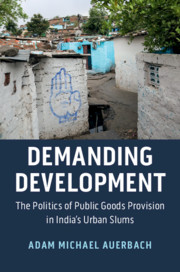Book contents
- Demanding Development
- Cambridge Studies in Comparative Politics
- Demanding Development
- Copyright page
- Dedication
- Contents
- Figures
- Tables
- Acknowledgments
- 1 Puzzling Disparities at the Margins of the City
- 2 Setting the Stage
- 3 How Party Worker Networks Impact Local Development
- 4 India’s Slum Leaders
- 5 Views from the Ground
- 6 Party Workers and Public Goods Provision
- 7 Why Party Worker Networks Spread Unevenly Across Settlements
- 8 Conclusion
- Book part
- Bibliography
- Index
- Other Books in the Series (continued from page iii)
1 - Puzzling Disparities at the Margins of the City
Published online by Cambridge University Press: 15 October 2019
- Demanding Development
- Cambridge Studies in Comparative Politics
- Demanding Development
- Copyright page
- Dedication
- Contents
- Figures
- Tables
- Acknowledgments
- 1 Puzzling Disparities at the Margins of the City
- 2 Setting the Stage
- 3 How Party Worker Networks Impact Local Development
- 4 India’s Slum Leaders
- 5 Views from the Ground
- 6 Party Workers and Public Goods Provision
- 7 Why Party Worker Networks Spread Unevenly Across Settlements
- 8 Conclusion
- Book part
- Bibliography
- Index
- Other Books in the Series (continued from page iii)
Summary
Chapter 1 motivates the central puzzle of the book: Despite a shared context of informality, patronage politics, and discretionary state institutions, India’s slum settlements are not uniformly marginalized in the distributive politics of the city. Instead, they exhibit dramatic variation in their capacity to organize and push the state to extend basic public services. The chapter begins with two vignettes that illustrate divergences in settlement organization and development. It then draws on official data and my own survey findings to establish wide variation in access to public services across India’s slums. Next, the chapter provides an overview of the book’s theoretical framework and foreshadows its contributions to several literatures in the field of comparative politics. Next, it positions the study at the intersection of several literatures and establishes why extant theories are insufficient in explaining inter-settlement variation in public service delivery. Next, the chapter defines the specific type of slum under study – squatter settlements – and introduces Jaipur and Bhopal. It then turns to the research design and data and concludes by mapping the remaining chapters.
Keywords
- Type
- Chapter
- Information
- Demanding DevelopmentThe Politics of Public Goods Provision in India's Urban Slums, pp. 1 - 41Publisher: Cambridge University PressPrint publication year: 2019
- 1
- Cited by

